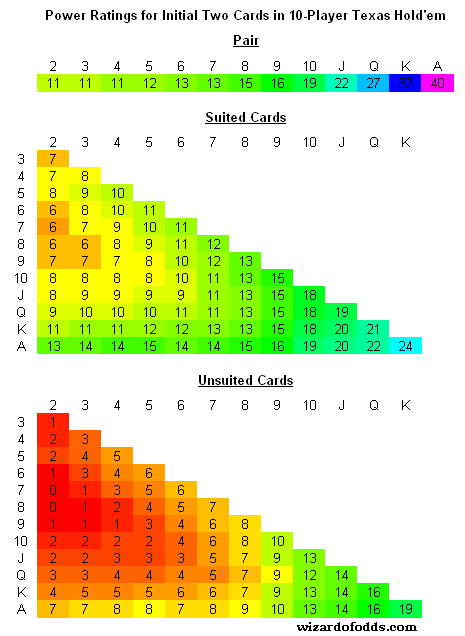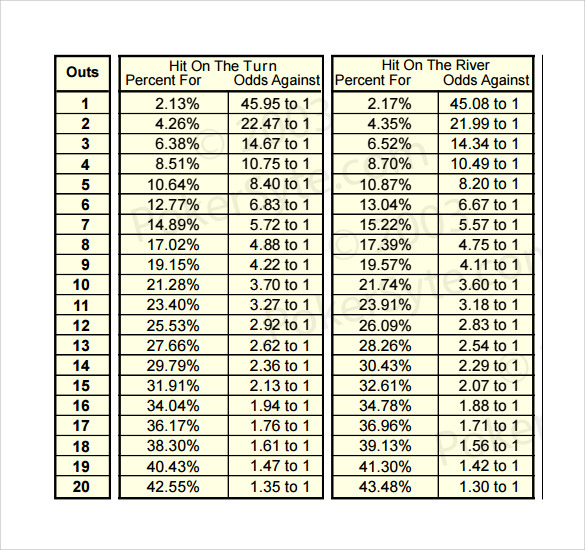Probability Of Poker Hands In Texas Holdem
That’s why it’s a general rule to fold 80-90% of hands when playing poker. The power of a full house When having two pair, the chances of making a full house are at 16.74% but when you have three of a kind, your odds of making a full house improve greatly, shooting up to 33.4%. Straight in poker is a much more common hand than those higher in poker hands rankings, so you will see it more often. Here are the most important odds for making poker Straight Texas Holdem hands: The odds of flopping a Straight is 1,04% when you have any connected starting hand. Pot odds are fixed; there is no actual calculation. However, 'implied odds' should be added in for the most accurate picture. In the scenario above, although your pot odds are 5:1, if there are 2 other people in the hand 'behind' you that haven't acted yet, and they each have $1 in their hand, waiting for you to call so they can call (bad poker etiquette), your implied odds, for just this. There are 7,462 distinct poker hands. Frequency of 7-card poker hands. In some popular variations of poker such as Texas Hold 'Em, a player uses the best five-card poker hand out of seven cards. The frequencies are calculated in a manner similar to that shown for 5-card hands, except additional complications arise due to the extra two cards in. The best possible hand in Texas hold'em is the combination of ten, jack, queen, king, ace, all of the same suit: 2. You might be wondering about the probability of poker hands.
- Probability Of Poker Hands In Texas Holdem Rules
- Probability Of Poker Hands In Texas Holdem Tournaments
- Probability Of Poker Hands In Texas Holdemas Hold Em
Both before and after the flop in any limit Holdem game, it is helpful to be able to make a reasonably accurate estimate of the types and numbers of playable hands that you are likely to be competing against.
Much of your decision making involves the business of 'putting' opposing players 'on their hands' (or in other words, figuring out what cards they are playing). Experienced Holdem players are often very good at this. An understanding of the types of hands that are most likely to be against you helps prevent both underestimating and overestimating your competition.
Here are some stats that are based on the total possible combinations of various Holdem hole cards that are normally playable.
For better viewing on your mobile device (or to download or print the chart), check out holdem hole card frequencies in high resolution universal .pdf format.
The five different types of two card Hold'em hands highlighted here are those that are most commonly played. They are not shown in any particular order and within the groups are powerful hands that are almost always played, down to marginal value hands that can be played under certain betting conditions.
The rest of the hands, shown as All Others, are all the very weak hands that most players hardly ever play.
Pairs - All pairs. AA, KK, QQ, JJ, 1010, 99, 88, 77, 66, 55, 44, 33, 22
Two High Cards Suited - AK(S), AQ(S), AJ(S), A10(S), KQ(S), KJ(S), K10(S), QJ(S), Q10(S), J10(S)

Two High Cards Unsuited - AK, AQ, AJ, A10, KQ, KJ, K10, QJ, Q10, J10
Medium and Low Suited Connectors - These include both no-gap and one-gap connectors: J9(S), 109(S), 108(S), 98(S), 97(S), 87(S), 86(S), 76(S), 75(S), 65(S), 64(S), 54(S), 53(S)
Ace and Non-High Combinations - A9, A8, A7,A6 Note: 25% of these 64 combinations (16) are suited. 75% of the 64 combinations (48) are unsuited.
Ever wondered where some of those odds in the odds charts came from? In this article, I will teach you how to work out the probability of being dealt different types of preflop hands in Texas Holdem.
It's all pretty simple and you don't need to be a mathematician to work out the probabilities. I'll keep the math part as straightforward as I can to help keep this an easy-going article for the both of us.
- Probability calculations quick links.
A few probability basics.
When working out hand probabilities, the main probabilities we will work with are the number of cards in the deck and the number of cards we want to be dealt. So for example, if we were going to deal out 1 card:
- The probability of dealing a 7 would be 1/52 - There is one 7 in a deck of 52 cards.
- The probability of dealing any Ace would be 4/52 - There four Aces in a deck of 52 cards.
- The probability of dealing any would be 13/52 - There are 13 s in a deck of 52 cards.
In fact, the probability of being dealt any random card (not just the 7) would be 1/52. This also applies to the probability being dealt any random value of card like Kings, tens, fours, whatever (4/52) and the probability of being dealt any random suit (13/52).
Each card is just as likely to be dealt as any other - no special priorities in this game!
The numbers change for future cards.
A quick example... let's say we want to work out the probability of being dealt a pair of sevens.
- The probability of being dealt a 7 for the first card will be 4/52.
- The probability of being dealt a 7 for the second card will be 3/51.
Notice how the probability changes for the second card? After we have been dealt the first card, there is now 1 less card in the deck making it 51 cards in total. Also, after already being dealt a 7, there are now only three 7s left in the deck.
Always try and take care with the numbers for future cards. The numbers will change slightly as you go along.

Working out probabilities.
- Whenever the word 'and' is used, it will usually mean multiply.
- Whenever the word 'or' is used, it will usually mean add.
This won't make much sense for now, but it will make a lot of sense a little further on in the article. Trust me.
Probability of being dealt two exact cards.
Multiply the two probabilities together.
So, we want to find the probability of being dealt the A and K. (See the 'and' there?)
- Probability of being dealt A - 1/52.
- Probability of being dealt K - 1/51.
Now let's just multiply these bad boys together.
P = (1/52) * (1/51)
P = 1/2652
So the probability of being dealt the A and then K is 1/2652. As you might be able to work out, this is the same probability for any two exact cards, as the likelihood of being dealt A K is the same as being dealt a hand like 7 3 in that order.
But wait, we do not care about the order of the cards we are dealt!
When we are dealt a hand in Texas Hold'em, we don't care whether we get the A first or the K first (which is what we just worked out), just as long as we get them in our hand it's all the same. There are two possible combinations of being dealt this hand (A K and K A), so we simply multiply the probability by 2 to get a more useful probability.
P = 1/2652 * 2
P = 1/1326
You might notice that because of this, we have also worked out that there are 1,326 possible combinations of starting hands in Texas Holdem. Cool huh?
Probability of being dealt a certain hand.
Two exact cards is all well and good, but what if we want to work out the chances of being dealt AK, regardless of specific suits and whatnot? Well, we just do the same again...
Multiply the two probabilities together.
So, we want to find the probability of being dealt any Ace andany King.
- Probability of being dealt any Ace - 4/52.
- Probability of being dealt any King - 4/51 (after we've been dealt our Ace, there are now 51 cards left).
P = (4/52) * (4/51)
P = 16/2652 = 1/166
However, again with the 2652 number we are working out the probability of being deal an Ace and then a King. If we want the probability of being dealt either in any order, there are two possible ways to make this AK combination so we multiply the probability by 2.
P = 16/2652 * 2
P = 32/2652
P = 1/83
The probability of being dealt any AK as opposed to an AK with exact suits is more probable as we would expect. A lot more probable in fact. Also, as you might guess, this probability of 1/83 will be the same for any two value of cards like; AQ, JT, 34, J2 and so on regardless of whether they are suited or not.
Probability of being dealt a range of hands.
Work out each individual hand probability and add them together.
What's the probability of being dealt AA or KK? (Spot the 'or' there? - Time to add.)
- Probability of being dealt AA - 1/221 (4/52 * 3/51 = 1/221).
- Probability of being dealt KK - 1/221 (4/52 * 3/51 = 1/221).
P = (1/221) + (1/221)
P = 2/221 = 1/110
Easy enough. If you want to add more possible hands in to the range, just work out their individual probability and add them in. So if we wanted to work out the odds of being dealt AA, KK or 7 3...
- Probability of being dealt AA - 1/221 (4/52 * 3/51 = 1/221).
- Probability of being dealt KK - 1/221 (4/52 * 3/51 = 1/221).
- Probability of being dealt 7 3 - 1/1326 ([1/52 * 1/51] * 2 = 1/1326).
P = (1/221) + (1/221) + (1/1326)
P = 359/36465 = 1/102
This one definitely takes more skill with adding fractions because of the different denominators, but you get the idea. I'm just teaching hand probabilities here, so I'm not going to go in to adding fractions in this article for now! This fractions calculator is really handy for adding those trickier probabilities quickly though.
Overview of working out hand probabilities.
Hopefully that's enough information and examples to allow you to go off and work out the probabilities of being dealt various hands and ranges of hands before the flop in Texas Holdem. The best way to learn how to work out probabilities is to actually try and work it out for yourself, otherwise the maths part will just go in one ear and out the other.
I guess this article isn't really going to do much for improving your game, but it's still pretty interesting to know the odds of being dealt different types of hands.
I'm sure that some of you reading this article were not aware that the probability of being dealt AA were exactly the same as the probability of being dealt 22! Well, now you know - it's 1/221.
Other useful articles.
- Poker mathematics.
- Pot odds.
- Equity in poker.

Go back to the poker odds charts.
Probability Of Poker Hands In Texas Holdem Rules

Can You Afford Not To Use
Poker Tracker 4?
“I wouldn’t play another session of online poker without it”
Probability Of Poker Hands In Texas Holdem Tournaments
“I play $25NL, and in under 1 week PT4 had paid for itself”
Probability Of Poker Hands In Texas Holdemas Hold Em
Comments